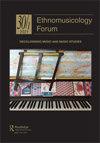Consensus process in the decision-making of a North American alternative brass band
IF 0.5
1区 艺术学
0 MUSIC
引用次数: 1
Abstract
ABSTRACT Consensus decision-making has become increasingly popular in social movements and other community projects, ideally amplifying feelings of investment and ownership in a project and its goals. While use of consensus has been notable in amateur musical spaces, this article examines the consensus process of a professionally oriented alternative brass band in the United States, exploring whether consensus can be effective, efficient, and just in a group that requires frequent executive decisions to function. Based on my seven years of participation in the band and an examination of the advantages and disadvantages identified by members, I contribute to an emerging interest in ensemble governance and argue that despite the many benefits of consensus, the process can also fail to build full solidarity and equality between members. I suggest that those seeking to decolonise or horizontalise traditional hierarchical leadership models must engage with the many pitfalls that unconventional governance structures can create.北美另类铜管乐队决策的共识过程
共识决策在社会运动和其他社区项目中越来越流行,理想地扩大了对项目及其目标的投资和所有权的感觉。虽然共识的使用在业余音乐空间中已经很明显,但本文研究了美国一个以专业为导向的另类铜管乐队的共识过程,探索共识是否可以在一个需要频繁执行决策的团体中有效、高效和公正。基于我在乐队七年的参与以及对成员确定的优势和劣势的研究,我提出了对集合治理的新兴兴趣,并认为尽管共识有许多好处,但该过程也可能无法在成员之间建立充分的团结和平等。我建议,那些寻求将传统等级领导模式去殖民化或横向化的人,必须正视非传统治理结构可能造成的许多陷阱。
本文章由计算机程序翻译,如有差异,请以英文原文为准。
求助全文
约1分钟内获得全文
求助全文
来源期刊

Ethnomusicology Forum
MUSIC-
CiteScore
1.10
自引率
25.00%
发文量
29
期刊介绍:
Articles often emphasise first-hand, sustained engagement with people as music makers, taking the form of ethnographic writing following one or more periods of fieldwork. Typically, ethnographies aim for a broad assessment of the processes and contexts through and within which music is imagined, discussed and made. Ethnography may be synthesised with a variety of analytical, historical and other methodologies, often entering into dialogue with other disciplinary areas such as music psychology, music education, historical musicology, performance studies, critical theory, dance, folklore and linguistics. The field is therefore characterised by its breadth in theory and method, its interdisciplinary nature and its global perspective.
 求助内容:
求助内容: 应助结果提醒方式:
应助结果提醒方式:


